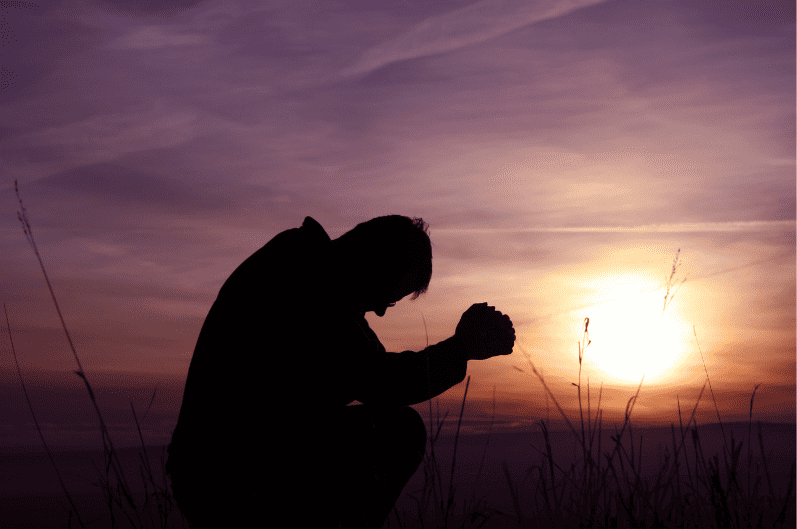“God, I offer myself to Thee – to build with me and to do with me as Thou wilt. Relieve me of the bondage of self, that I may better do Thy will. Take away my difficulties, that victory over them may bear witness to those I would help of Thy Power, Thy Love, and Thy Way of Life. May I do Thy will Always!” (Third Step prayer of the 12 Step program)
Have you turned your will and your life over to God? What does ‘Thy Will Be Done’ mean?
Most of us have life plans, desires and wants. No matter our age, gender, socioeconomic status, or education, most of us want something from God. Furthermore, though we may not think of it in this regard, if we are honest, we often come from a position of self-centeredness, considering our needs and wants to be the most pressing. We pray for what we want and for what we have determined to be best and can get distracted by “My Will” rather than “Thy Will.
In a world that emphasizes achievement, self-reliance, and self-control, the idea of surrendering to a higher power can be challenging for many individuals. However, the phrase “Thy Will not My Will be done” holds profound wisdom and offers a path to navigate which brings peace, acceptance, and spiritual growth.
In the Lord’s Prayer, “Thy kingdom come. Thy will be done on earth as it is in heaven”. Mathew 6:10 enumerates the concept of surrendering one’s desires, hopes, plans, and ambitions to God. It acknowledges that there is a divine plan beyond our limited understanding and that surrendering to it can lead to a more fulfilling and purposeful life.
Some believe that surrendering is an act of weakness. Surrendering requires faith. And faith means courage. It means we trust our God. Therefore, at its core, surrendering to God is an act of strength and humility. It requires acknowledging that we are not the ultimate authority in our lives and that there is a power greater than ourselves that guides us, protects us and gives us strength. This surrender is an act that involves both trust and belief in a power greater than ourselves. That power is God.
When we let go of our own will and surrender to a higher power, we can face this world of uncertainties and open ourselves up to a world of infinite possibilities. We can release the need for control and the drive to secure every aspect of our lives and instead allow God to guide us towards what is truly meant for us. This surrender can bring a sense of peace and freedom, as we no longer have to carry the weight of the world on our shoulders.
Fear is the main cause of leaning into self, for needing control and for exercising self-will. Surrendering to God allows us to cultivate a deeper sense of faith, belief and trust. It requires us to let go of our need for certainty, our drive of self-will and embrace the unknown. By surrendering, we acknowledge that there is a divine plan unfolding, even if we cannot fully comprehend it. This trust in God can provide solace during challenging times and help us find meaning in the midst of challenge.
Surrendering to God fosters both personal growth and spiritual development. It invites us to let go of our self-centered, ego-driven desires and focus instead on a higher purpose. By relinquishing our own will, our self control, we become more open to receiving the direction, wisdom, and inspiration from the Lord. This can lead to a deeper connection with our inner selves, others, and the world around us.
Surrendering does not mean that we become indifferent or that we become passive observers of our lives. It is not about relinquishing responsibility or giving up on our plans, dreams and aspirations. Rather, it is about taking action and leaning on prayer and trusting in a higher plan. It is about aligning our thoughts, intentions and behaviors with the greater good, rather than solely pursuing our own self-interests.
In practice, embracing “Thy Will” requires letting go of our attachments to our self-determined outcome. It involves practicing mindfulness, being present in the moment, and detaching ourselves from the outcomes. It also involves seeking guidance through prayer, meditation, or other spiritual practices that help us connect with the divine.
While it is natural to struggle with life challenges, suffering is created in the mind and typically results from multiple forms of fear, self-delusion, and self-seeking behaviors. In these circumstances one tends to “cling to” or “resist” a particular outcome. It is when one has a desired outcome that they believe is best and will do anything to make it happen. When one can release their desired outcome and lean into “Thy Will” they will experience the freedom of embracing their powerlessness.
Ultimately, we should be looking for God’s will to be done in everything. I cannot count how many times I have gone to God with my list of requests. “Dear Lord please protect my family, please keep my dog safe, please have them accept this offer on that house, please make my car start”. I often have a laundry list of things I need the Lord to address immediately. While it is true we often have pressing needs and things we need attended to. We need to acknowledge that those things may not be in alignment with God’s will for our lives.
Seeking and following God’s will instead of our own is imperative. “Give thanks in all circumstances; for this is the will of God in Christ Jesus for you. (1 Thessalonians 5:18)
Growing up I always thought my mother would out-live my father. However, two years ago my mother passed suddenly from a brain aneurysm and I was shocked. Leaning into this scripture I now realize and feel so very blessed by the understanding that I would never have experienced the relationship I now have with my father if he had passed first. I will forever be thankful for this time I have had with my father to know him in a way I had never before experienced.
“In everything give thanks: for this is the will of God in Christ Jesus concerning you.” (1 Thessalonians 5:18) When my daughter was diagnosed with BiPolar Disorder, ADHD and Generalized Anxiety Disorder at the age of 14, I struggled intensely. I could not begin to understand how to give thanks for this life long mental illness she would need to navigate. However, 8 years later, 19 different medication trials, endless hours of therapy and many hours spent in prayer, I not only understand the power and strength of God, I intimately know both personally and professionally what this journey involves and can use that experience to guide so many others through this challenge. I give thanks for this.
Review your fears thoroughly. Put them down on paper. Ask yourself why you have them. Then ask God to remove your fear and direct your attention to what he would have for you. Faith does for us what we cannot do for ourselves. “Thy Will” not “My Will” be done.
































































